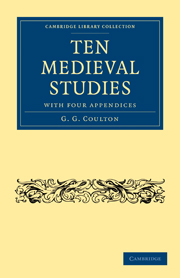Book contents
- Frontmatter
- PREFACE TO FIRST EDITION (1906)
- PREFACE TO SECOND EDITION (1915)
- PREFACE TO THIRD EDITION
- Contents
- I The Monastic Legend
- II A Revivalist of Six Centuries Ago
- III Side-Lights on the Franciscans
- IV The High Ancestry of Puritanism
- V Romanism and Morals
- VI The Truth about the Monasteries
- VII Religious Education before the Reformation
- VIII Priests and People before the Reformation
- IX The Failure of the Friars
- XIII The Plain Man's Religion in the Middle Ages
- Appendices
- Index
V - Romanism and Morals
Published online by Cambridge University Press: 07 September 2010
- Frontmatter
- PREFACE TO FIRST EDITION (1906)
- PREFACE TO SECOND EDITION (1915)
- PREFACE TO THIRD EDITION
- Contents
- I The Monastic Legend
- II A Revivalist of Six Centuries Ago
- III Side-Lights on the Franciscans
- IV The High Ancestry of Puritanism
- V Romanism and Morals
- VI The Truth about the Monasteries
- VII Religious Education before the Reformation
- VIII Priests and People before the Reformation
- IX The Failure of the Friars
- XIII The Plain Man's Religion in the Middle Ages
- Appendices
- Index
Summary
Never was there so great a show of wisdom, nor such restless and world-wide activity in so many branches of study, as in the last forty years… yet never did such ignorance and error reign as now.… For more sins sway the world in these days than in any previous age; and sin is incompatible with true learning…. Therefore, since men's lives contradict the laws of Wisdom, they cannot possibly understand Her, even though they roll pompous phrases in their mouths, like boys gabbling their Psalms by rote, or like clerks and country priests repeating the Church services—of which they understand little or nothing—after the fashion of brute beasts.
The first sentences, a reader might say, are from Dr Barry's indictment of this agnostic century in a recent number of The National Review; the last words are the words of Mr Kensit. Yet in fact the whole quotation is from one of the greatest philosophers of the Ages of Faith, and one of the greatest Englishmen of all times: Roger Bacon. It may be found (with much more to the same purpose) in the beginning of his Compendium, of the Study of Philosophy, dedicated about 1271 to the reigning Pope. The “forty years” refer, as he expressly tells us, to the Franciscan and Dominican reform; yet, after a generation of that reform, the boasted learning of the thirteenth century was, in Bacon's judgment, rotten to the core.
- Type
- Chapter
- Information
- Ten Medieval Studieswith Four Appendices, pp. 72 - 83Publisher: Cambridge University PressPrint publication year: 2010First published in: 1930



